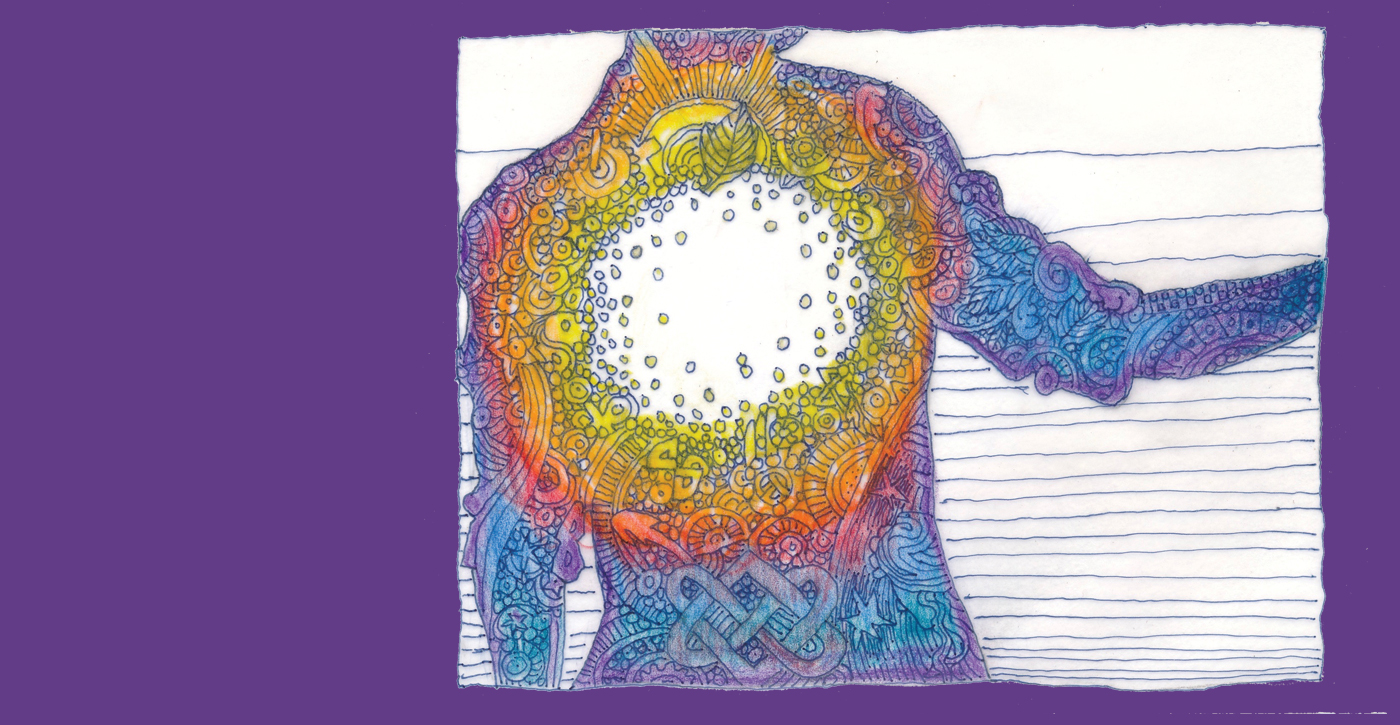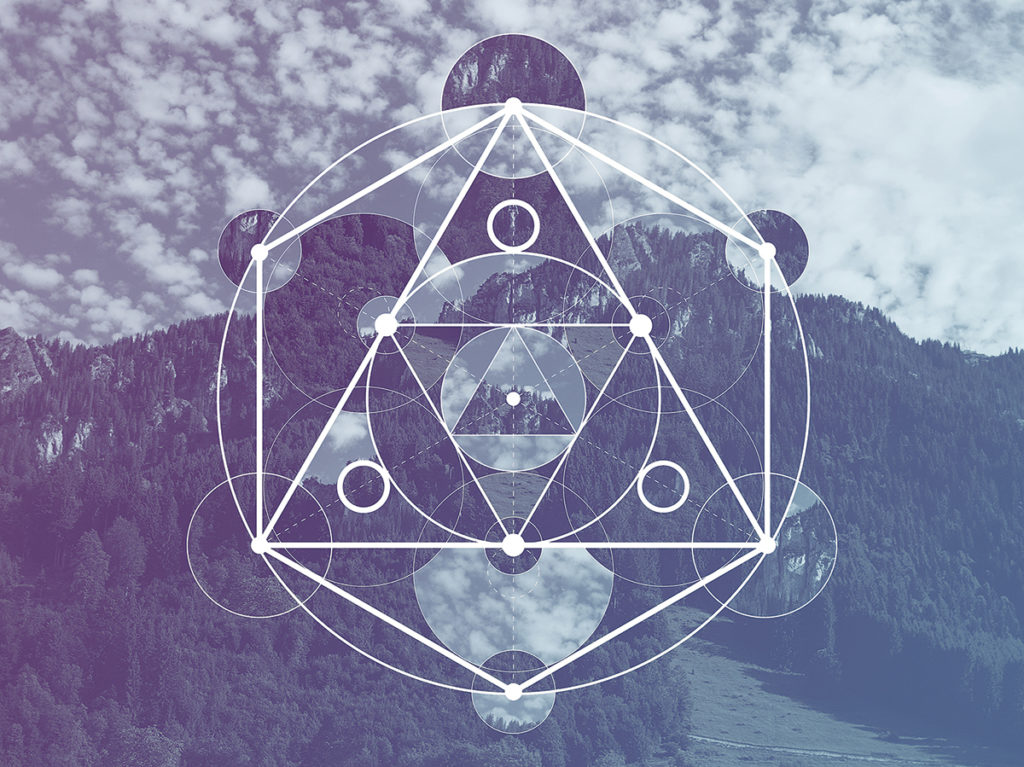42 – review
This Jackie Robinson biopic is heroic but doesn't quite do justice to its source material

Mark Kermode
@KermodeMovie
Sun 15 Sep 2013 09.06 AEST
In the still-segregated 1940s, Jackie Robinson made history by becoming the first African-American to compete in major league baseball in the modern era, and you'd have to work pretty hard to make a Horlicks of his heroic life story. It's in safe hands here with Brian Helgeland, whose no-nonsense direction recalls the straight-bat delivery of late-period Clint Eastwood.
Imposing Chadwick Boseman (stepping into shoes previously filled on screen by Robinson himself) is well cast as the stoical hard-hitter whose presence on the field both inspires and outrages; while a scene of prolonged racist haranguing rattles and alarms, it's the quieter institutionalised slights that really hit home. Harrison Ford gets to growl with avuncular gruffness as team leader Branch Rickey, the man calling the shots on Robinson's ascent to greatness whose proclaimed desire to win hides a far more noble aspiration. It's inspirational fare, although such a remarkable story perhaps deserves a rather more remarkable movie.
42 (2013)
A J
a year ago
This was an absolute banger of a movie. The acting was so incredibly passionate and as a guy who knows absolutely NOTHING about baseball, i can say with full confidence that I had a deep connection with this movie. Chadwick Boseman really did a great job of bringing Jackies life struggles to the screen, in fact all the actors were top notch, from the racist antagonists to the brave and good hearted protagonists. I think the filming techniques were amazing, how they kept shooting him at either lo ...MORE
18 people found this helpful.
Helpful
Javier Ruiz
2 years ago
If you are a Los Angeles Dodgers fan than this movie is a great watch. The movie is about Jackie Robinson being on the Dodgers back in the 1940 when they were stationed in their birthplace Brooklyn, New York. This was during a period in time of segregation, racism, and hate. Jackie would become the first African American to play in the Major League Baseball. I really enjoy the history told of the Dodgers and how Jackie and Baseball was apart of the movement that helped end segregation. It is a b ...MORE
17 people found this helpful.
Helpful


Adrian Moore
8 months ago
I've just bought this movie 42 and I can honestly say excellent from start to end on the story of Jackie Robinson and the abuse and racism in which went on and the movie shows what strong will power Jackie Robinson had not to give up. And Chadwick Boseman absolutely does one hell of a job to bring this to our attention. Despite what colour we all are we still are human and we should accept people of different colour and race into our lives we also know it still goes on in sport and in every day ...MORE
3 people found this helpful.
Helpful


Cassandra Jacklya
a month ago
Absolutely breathtaking! The emotions surged up within me with sighs of relieved, happiness, anger and in awe of the way the characters have portrayed themselves in this movie. Worth watching over and over again. I wish this comes back up to light because it tells a story although been told over a million times, the harmony is what we still lack and this movie definitely tells it all. A big applause to all the actors and actresses, you have given us a great movie as well as to the crew and direc ...MORE
Was this review helpful to you?
Helpful


Alexander Heidelberg
a year ago
Warner Bros. Chadwick Boseman 42 (2013) Was A 2013 Sport/Drama Movie Starring Chadwick Boseman As Jackie Robinson,Harrison Ford,Nicole Beharie,Lucas Black,Alan Tudyk,Christopher Meloni,T.R. Knight, Andre Holland,Ryan Merriman,John C.McGinley,Hamish Linklater,Leo Durocher,Pee Wee Reese,James Pickens Jr.,Brad Breyer,Toby Huss,Max Gail,Brett Cullen,Peter Mackenzie,Gino Anthony Pesi,Jesse Luken,Jeremy Ray Taylor,C.J. Nitkowski,Kelley Jakle,Derek Phillips,Dusan Brown,Jud Tylor,Mark Harelik,Rhoda Grif ...MORE
4 people found this helpful.
Helpful


Lillian Williams
11 months ago
This movie was an eye opener for how Jackie Robinson was like when he was in the Major Leagues and how unfairly he was treated just because of his skin color. But it also showed us that some people are going to stick with you through thick and thin. The amazing way Robinson broke through the racial barrier will be an inspiration for generations to come. This movie is phenomenal and also rest in peace to Robinson and Boseman
2 people found this helpful.
Helpful


Vivienne J. Roe
3 months ago
I love how it's based on Jackie Robinson's story. I can personally relate to the character because I have dealt with discrimination and racism in my life as an asian. Also, Harrison Ford was awesome in this movie. I loved his part so much as well as the actor who played Jackie Robinson.
Was this review helpful to you?
Helpful


Ashmah Diallo
2 years agoG M this isn't something you should have negative thoughts or opinions about. They have made a movie and worked really hard to honor a man, a great man. The movie was made that how people like you back in the day treated people of color and you should have respect for the movie. Jackie Robinson made a change in Major League Baseball. He has worked hard and has never fought back to racist people like yourself. So the next time you have something negative to say about someone who has made a great ...MORE
80 people found this helpful.
Helpful


G M
2 years agoJust saw this movie for the first time in 2019 and it is one of the worst movies I've ever seen. It appears that the nobility of the subject was considered an excuse for almost every screenplay blunder that could be made. If anything, can be seen as an adapted version of JR's life for teens prone to violence in response to overt racial harassment. You might think that I dislike this movie because I might be racist but that's my point in the first place. Embarrassing acting from H FORD as Branch ...MORE
13 people found this helpful.
Helpful


Daniel McCullough
2 months ago
i love this movie and why is because it reflects on Black Culture in black history and you get a first perspective view of what they had to go though black people at the time went though so much because a lot of the world did not give that much respect as they do today and this movie shows that they we're not just doing this for fame but in reality they were doing it for their culture and they were fighting for the right's this movie shows how much they had to hold back in the anger and the ...MORE
Was this review helpful to you?
Helpful


Annie bentley
a year ago
This movie made me cry I hate chick flicks I love history movies and this movie was the best!! I'm English so I don't get baseball/rounders but I loved this movie and the history the actors were amazing. Great watch for family's couples or even the singles on a day off. Definitely a much watch movie!!!!!
5 people found this helpful.
Helpful


simon harris
a year ago
This is an excellent movie, one i really enjoyed. Boseman played the roll well (stoic). Being based on a true story and if taken as some kind of benchmark then we have come some distance due to the power of just a few and they never set fire to a single thing. Wonderful movie.
3 people found this helpful.
Helpful


Steve Corbeil
2 years agoGreat movie, very inspiring. I did find myself feeling disgusted with what Jackie had to endure on and off the field. But it was amazing what he did to overcome the hatred and bigotry of that era in American history. If you are baseball lover, you will really enjoy this movie.
48 people found this helpful.
Helpful


Jan Laman
a month ago
Such stellar performances all around with Chadwick Boseman being a true star. Harrison Ford showed great acting chops. Emotions and drama run high--you see the racists in all their ignorance to those who believe in equality for human beings and to those who change!
Was this review helpful to you?
Helpful


andrew lost
9 months ago
Yes this is a great movie with one of the best actors playing the legend jackie Robinson. If you know the story you will like this movie if you know nothing about this story you will love this movie. This is a story that Hollywood needed to tell and is one of those movie that just makes you feel good inside,
Was this review helpful to you?
Helpful


Marcelle Decoteau
2 years agoI love 💘 this movie 🎬 think 💭 it is great 🏆. Also think what ❓ Jackie Robinson had go through is alful. He couldn't defied himself if he did. It would go against him. I think that is just sad 😢. Everyone should have the right to defined themselves. No matter who they are. What color 🎨 their skin is. That should not matter but sadly back then it did.
17 people found this helpful.
Helpful


Beth Ashkettle
2 years agoI really enjoyed this movie, as did my 12yo son. Eye opening and shocking to realise this behavior was occurring in our recent history. Great watch, the audience is rooting for Jackie from the beginning
12 people found this helpful.
Helpful


Mary Acharya
a year ago
I think everyone should watch this movie..this film is beyond good and bad..I just loved it..every actor is brilliant...this is a story of a man who have shown all the mankind that,only thing is matter is your work,and not your colour or how you look like...Boseman,you will be always in my heart..rest in power KING..
1 person found this helpful.
Helpful


Brian Sivell
4 months ago
I was a kid who grew up in Montreal. I was to young to know who Jackie Robinson was. I went to school with Roslyn Allain who was related to Jackie Robinson. The family moved away when I was young. I was a huge baseball fan and went to many Montreal Expos baseball games. The big O was never meant for baseball. I only wish that Jackie Robinson was more celebrated in Montreal. I had the great pleasure of seeing some of the best baseball players in the world.
Was this review helpful to you?
Helpful


Santhosh V
a year ago
It's Simply inspirational..how this tiny mind of ours fixes us with our physicality.And humanity is much more beyond that.There was a dialogue of jack being superhuman,here I love to echo the words of my guru " it's not about being superhuman but being human itself is super"the movie proves that.
1 person found this helpful.
Helpful


Robin Walper
2 years agoI very much liked it as it avoided hoo-ha and got to it. I have been blessed to meet Harrison Ford but never worked with him in the business and it's clear he is in this fully. Chadwick Boseman is the same in his acting style; avoid the circus tricks and bring the truth. All should watch this--- especially our young ones as there's so little truth, accountability, individualism, hard work ethic or dreaming the impossible dream and then doing what ever it takes to make it so.
7 people found this helpful.
Helpful


Helen Williams
a year ago
Great movie for Black History month. People need to see how racism was in America.......truly blatant, Now more subtle and underground.......but it is still there I am afraid! Have watched this movie time and time again......it does try to send a positive message. But life can be cruel!
1 person found this helpful.
Helpful


Stacey Stevens
2 years agoI loved “42” and what touched me most is that the main characters persevered through the characteristics of love. Harrison Ford deserved an Oscar for his performance. Liked him in this role more than any other and I’ve always been a fan of his.
17 people found this helpful.
Helpful
Adrian Moore
8 months ago
I've just bought this movie 42 and I can honestly say excellent from start to end on the story of Jackie Robinson and the abuse and racism in which went on and the movie shows what strong will power Jackie Robinson had not to give up. And Chadwick Boseman absolutely does one hell of a job to bring this to our attention. Despite what colour we all are we still are human and we should accept people of different colour and race into our lives we also know it still goes on in sport and in every day ...MORE
3 people found this helpful.
Helpful
Cassandra Jacklya
a month ago
Absolutely breathtaking! The emotions surged up within me with sighs of relieved, happiness, anger and in awe of the way the characters have portrayed themselves in this movie. Worth watching over and over again. I wish this comes back up to light because it tells a story although been told over a million times, the harmony is what we still lack and this movie definitely tells it all. A big applause to all the actors and actresses, you have given us a great movie as well as to the crew and direc ...MORE
Was this review helpful to you?
Helpful
Alexander Heidelberg
a year ago
Warner Bros. Chadwick Boseman 42 (2013) Was A 2013 Sport/Drama Movie Starring Chadwick Boseman As Jackie Robinson,Harrison Ford,Nicole Beharie,Lucas Black,Alan Tudyk,Christopher Meloni,T.R. Knight, Andre Holland,Ryan Merriman,John C.McGinley,Hamish Linklater,Leo Durocher,Pee Wee Reese,James Pickens Jr.,Brad Breyer,Toby Huss,Max Gail,Brett Cullen,Peter Mackenzie,Gino Anthony Pesi,Jesse Luken,Jeremy Ray Taylor,C.J. Nitkowski,Kelley Jakle,Derek Phillips,Dusan Brown,Jud Tylor,Mark Harelik,Rhoda Grif ...MORE
4 people found this helpful.
Helpful
Lillian Williams
11 months ago
This movie was an eye opener for how Jackie Robinson was like when he was in the Major Leagues and how unfairly he was treated just because of his skin color. But it also showed us that some people are going to stick with you through thick and thin. The amazing way Robinson broke through the racial barrier will be an inspiration for generations to come. This movie is phenomenal and also rest in peace to Robinson and Boseman
2 people found this helpful.
Helpful
Vivienne J. Roe
3 months ago
I love how it's based on Jackie Robinson's story. I can personally relate to the character because I have dealt with discrimination and racism in my life as an asian. Also, Harrison Ford was awesome in this movie. I loved his part so much as well as the actor who played Jackie Robinson.
Was this review helpful to you?
Helpful
Ashmah Diallo
2 years agoG M this isn't something you should have negative thoughts or opinions about. They have made a movie and worked really hard to honor a man, a great man. The movie was made that how people like you back in the day treated people of color and you should have respect for the movie. Jackie Robinson made a change in Major League Baseball. He has worked hard and has never fought back to racist people like yourself. So the next time you have something negative to say about someone who has made a great ...MORE
80 people found this helpful.
Helpful
G M
2 years agoJust saw this movie for the first time in 2019 and it is one of the worst movies I've ever seen. It appears that the nobility of the subject was considered an excuse for almost every screenplay blunder that could be made. If anything, can be seen as an adapted version of JR's life for teens prone to violence in response to overt racial harassment. You might think that I dislike this movie because I might be racist but that's my point in the first place. Embarrassing acting from H FORD as Branch ...MORE
13 people found this helpful.
Helpful
Daniel McCullough
2 months ago
i love this movie and why is because it reflects on Black Culture in black history and you get a first perspective view of what they had to go though black people at the time went though so much because a lot of the world did not give that much respect as they do today and this movie shows that they we're not just doing this for fame but in reality they were doing it for their culture and they were fighting for the right's this movie shows how much they had to hold back in the anger and the ...MORE
Was this review helpful to you?
Helpful
Annie bentley
a year ago
This movie made me cry I hate chick flicks I love history movies and this movie was the best!! I'm English so I don't get baseball/rounders but I loved this movie and the history the actors were amazing. Great watch for family's couples or even the singles on a day off. Definitely a much watch movie!!!!!
5 people found this helpful.
Helpful
simon harris
a year ago
This is an excellent movie, one i really enjoyed. Boseman played the roll well (stoic). Being based on a true story and if taken as some kind of benchmark then we have come some distance due to the power of just a few and they never set fire to a single thing. Wonderful movie.
3 people found this helpful.
Helpful
Steve Corbeil
2 years agoGreat movie, very inspiring. I did find myself feeling disgusted with what Jackie had to endure on and off the field. But it was amazing what he did to overcome the hatred and bigotry of that era in American history. If you are baseball lover, you will really enjoy this movie.
48 people found this helpful.
Helpful
Jan Laman
a month ago
Such stellar performances all around with Chadwick Boseman being a true star. Harrison Ford showed great acting chops. Emotions and drama run high--you see the racists in all their ignorance to those who believe in equality for human beings and to those who change!
Was this review helpful to you?
Helpful
andrew lost
9 months ago
Yes this is a great movie with one of the best actors playing the legend jackie Robinson. If you know the story you will like this movie if you know nothing about this story you will love this movie. This is a story that Hollywood needed to tell and is one of those movie that just makes you feel good inside,
Was this review helpful to you?
Helpful
Marcelle Decoteau
2 years agoI love 💘 this movie 🎬 think 💭 it is great 🏆. Also think what ❓ Jackie Robinson had go through is alful. He couldn't defied himself if he did. It would go against him. I think that is just sad 😢. Everyone should have the right to defined themselves. No matter who they are. What color 🎨 their skin is. That should not matter but sadly back then it did.
17 people found this helpful.
Helpful
Beth Ashkettle
2 years agoI really enjoyed this movie, as did my 12yo son. Eye opening and shocking to realise this behavior was occurring in our recent history. Great watch, the audience is rooting for Jackie from the beginning
12 people found this helpful.
Helpful
Mary Acharya
a year ago
I think everyone should watch this movie..this film is beyond good and bad..I just loved it..every actor is brilliant...this is a story of a man who have shown all the mankind that,only thing is matter is your work,and not your colour or how you look like...Boseman,you will be always in my heart..rest in power KING..
1 person found this helpful.
Helpful
Brian Sivell
4 months ago
I was a kid who grew up in Montreal. I was to young to know who Jackie Robinson was. I went to school with Roslyn Allain who was related to Jackie Robinson. The family moved away when I was young. I was a huge baseball fan and went to many Montreal Expos baseball games. The big O was never meant for baseball. I only wish that Jackie Robinson was more celebrated in Montreal. I had the great pleasure of seeing some of the best baseball players in the world.
Was this review helpful to you?
Helpful
Santhosh V
a year ago
It's Simply inspirational..how this tiny mind of ours fixes us with our physicality.And humanity is much more beyond that.There was a dialogue of jack being superhuman,here I love to echo the words of my guru " it's not about being superhuman but being human itself is super"the movie proves that.
1 person found this helpful.
Helpful
Robin Walper
2 years agoI very much liked it as it avoided hoo-ha and got to it. I have been blessed to meet Harrison Ford but never worked with him in the business and it's clear he is in this fully. Chadwick Boseman is the same in his acting style; avoid the circus tricks and bring the truth. All should watch this--- especially our young ones as there's so little truth, accountability, individualism, hard work ethic or dreaming the impossible dream and then doing what ever it takes to make it so.
7 people found this helpful.
Helpful
Helen Williams
a year ago
Great movie for Black History month. People need to see how racism was in America.......truly blatant, Now more subtle and underground.......but it is still there I am afraid! Have watched this movie time and time again......it does try to send a positive message. But life can be cruel!
1 person found this helpful.
Helpful
Stacey Stevens
2 years agoI loved “42” and what touched me most is that the main characters persevered through the characteristics of love. Harrison Ford deserved an Oscar for his performance. Liked him in this role more than any other and I’ve always been a fan of his.

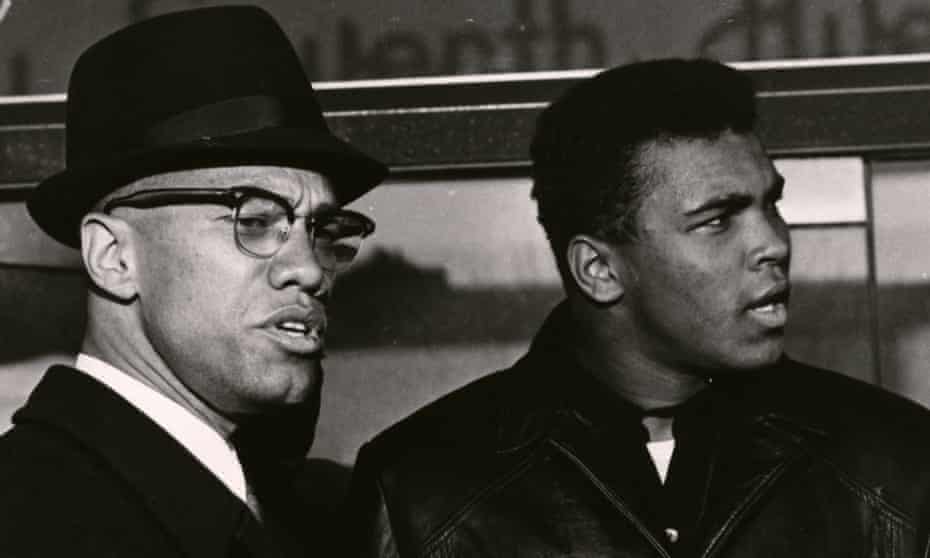 Malcolm X & Muhammad Ali Photograph: Netflix
Malcolm X & Muhammad Ali Photograph: Netflix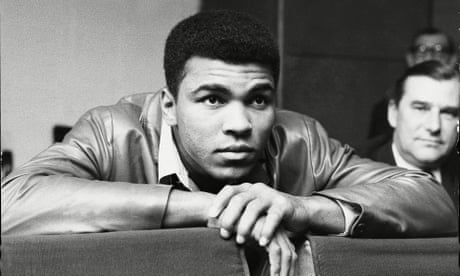
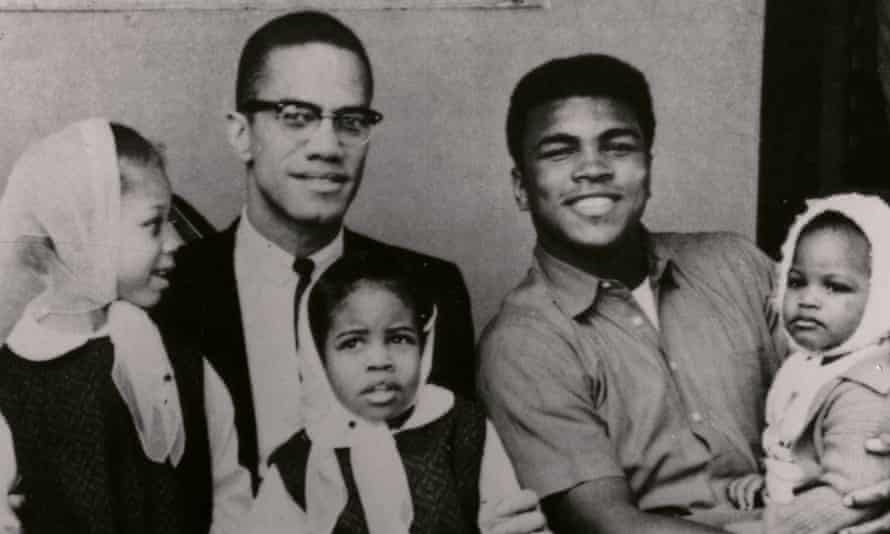 Malcolm X and Muhammad Ali with their children Photograph: Netflix
Malcolm X and Muhammad Ali with their children Photograph: Netflix